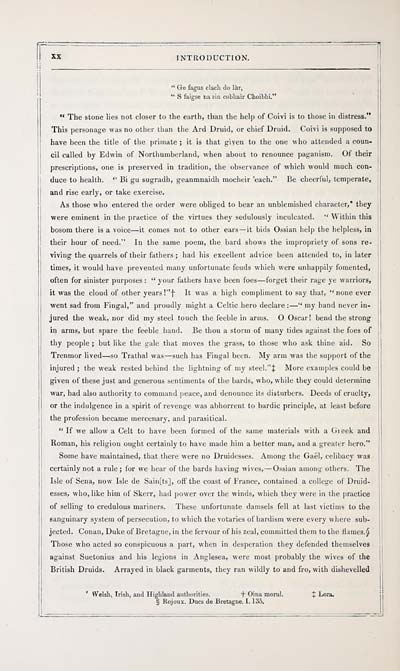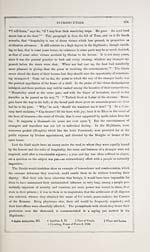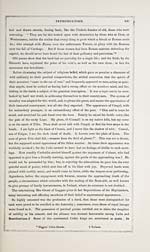Blair Collection > Sar-obair nam bard gaelach, or, The beauties of Gaelic poetry, and lives of the Highland bards
(30)
Download files
Complete book:
Individual page:
Thumbnail gallery: Grid view | List view

INTRODUCTION.
" Ge fagus clach do lar,
" S faigse na sin cobhair Choibhi."
" The stone lies not closer to the earth, than the help of Coivi is to those in distress."
This personage was no other than the Ard Druid, or chief Druid. Coivi is supposed to
have been the title of the primate ; it is that given to the one who attended a coun-
cil called by Edwin of Northumberland, when about to renounce paganism. Of their
prescriptions, one is preserved in tradition, the observance of which would much con-
duce to health. " Bi gu sugradh, geanmnaidh mocheir each." Be cheerful, temperate,
and rise early, or take exercise.
As those who entered the order were obliged to bear an unblemished character,* they
were eminent in the practice of the virtues they sedulously inculcated. " Within this
bosom there is a voice — it conies not to other ears — it bids Ossian help the helpless, in
their hour of need." In the same poem, the bard shows the impropriety of sons re-
viving the quarrels of their fathers ; had his excellent advice been attended to, in later
times, it would have prevented many unfortunate feuds which were unhappily fomented,
often for sinister purposes: "your fathers have been foes — forget their rage ye warriors,
it was the cloud of other years l"^ It was a high compliment to say that, "none ever
went sad from Fingal," and proudly might a Celtic hero declare : — " my hand never in-
jured the weak, nor did my steel touch the feeble in arms. O Oscar! bend the strong
in arms, but spare the feeble hand. Be thou a storm of many tides against the foes of
thy people ; but like the gale that moves the grass, to those who ask thine aid. So
Trenmor lived — so Trathal was — such has Fingal been. My arm was the support of the
injured ; the weak rested behind the lightning of my steel. "J More examples could be
given of these just and generous sentiments of the bards, who, while they could determine
war, had also authority to command peace, and denounce its disturbers. Deeds of cruelty,
or the indulgence in a spirit of revenge was abhorrent to bardic principle, at least before
the profession became mercenary, and parasitical.
" If we allow a Celt to have been formed of the same materials with a Gieek and
Roman, his religion ought certainly to have made him a better man, and a greater hero."
Some have maintained, that there were no Druidesses. Among the Gael, celibacy was
certainly not a rule; for we hear of the bards having wives, — Ossian among others. The
Isle of Sena, now Isle de Sain[ts], oft' the coast of France, contained a college of Druid-
esses, who, like him of Skerr, had power over the winds, which they were in the practice
of selling to credulous mariners. These unfortunate damsels fell at last victims to the
sanguinary system of persecution, to which the votaries of bardism were every where sub-
jected. Conan, Duke of Bretagne, in the fervour of his zeal, committed them to the flames.}
Those who acted so conspicuous a part, when in desperation they defended themselves
against Suetonius and his legions in Anglesea, were most probably the wives of the
British Druids. Arrayed in black garments, they ran wildly to and fro, with dishevelled
' Welsh, Irish, and Highland authorities. + Oina morul. J Lora.
§ Rojoux. Dues de Bretagne. 1. 135.
" Ge fagus clach do lar,
" S faigse na sin cobhair Choibhi."
" The stone lies not closer to the earth, than the help of Coivi is to those in distress."
This personage was no other than the Ard Druid, or chief Druid. Coivi is supposed to
have been the title of the primate ; it is that given to the one who attended a coun-
cil called by Edwin of Northumberland, when about to renounce paganism. Of their
prescriptions, one is preserved in tradition, the observance of which would much con-
duce to health. " Bi gu sugradh, geanmnaidh mocheir each." Be cheerful, temperate,
and rise early, or take exercise.
As those who entered the order were obliged to bear an unblemished character,* they
were eminent in the practice of the virtues they sedulously inculcated. " Within this
bosom there is a voice — it conies not to other ears — it bids Ossian help the helpless, in
their hour of need." In the same poem, the bard shows the impropriety of sons re-
viving the quarrels of their fathers ; had his excellent advice been attended to, in later
times, it would have prevented many unfortunate feuds which were unhappily fomented,
often for sinister purposes: "your fathers have been foes — forget their rage ye warriors,
it was the cloud of other years l"^ It was a high compliment to say that, "none ever
went sad from Fingal," and proudly might a Celtic hero declare : — " my hand never in-
jured the weak, nor did my steel touch the feeble in arms. O Oscar! bend the strong
in arms, but spare the feeble hand. Be thou a storm of many tides against the foes of
thy people ; but like the gale that moves the grass, to those who ask thine aid. So
Trenmor lived — so Trathal was — such has Fingal been. My arm was the support of the
injured ; the weak rested behind the lightning of my steel. "J More examples could be
given of these just and generous sentiments of the bards, who, while they could determine
war, had also authority to command peace, and denounce its disturbers. Deeds of cruelty,
or the indulgence in a spirit of revenge was abhorrent to bardic principle, at least before
the profession became mercenary, and parasitical.
" If we allow a Celt to have been formed of the same materials with a Gieek and
Roman, his religion ought certainly to have made him a better man, and a greater hero."
Some have maintained, that there were no Druidesses. Among the Gael, celibacy was
certainly not a rule; for we hear of the bards having wives, — Ossian among others. The
Isle of Sena, now Isle de Sain[ts], oft' the coast of France, contained a college of Druid-
esses, who, like him of Skerr, had power over the winds, which they were in the practice
of selling to credulous mariners. These unfortunate damsels fell at last victims to the
sanguinary system of persecution, to which the votaries of bardism were every where sub-
jected. Conan, Duke of Bretagne, in the fervour of his zeal, committed them to the flames.}
Those who acted so conspicuous a part, when in desperation they defended themselves
against Suetonius and his legions in Anglesea, were most probably the wives of the
British Druids. Arrayed in black garments, they ran wildly to and fro, with dishevelled
' Welsh, Irish, and Highland authorities. + Oina morul. J Lora.
§ Rojoux. Dues de Bretagne. 1. 135.
Set display mode to: Large image | Transcription
Images and transcriptions on this page, including medium image downloads, may be used under the Creative Commons Attribution 4.0 International Licence unless otherwise stated. ![]()
| Early Gaelic Book Collections > Blair Collection > Sar-obair nam bard gaelach, or, The beauties of Gaelic poetry, and lives of the Highland bards > (30) |
|---|
| Permanent URL | https://digital.nls.uk/81868228 |
|---|
| Description | A selection of books from a collection of more than 500 titles, mostly on religious and literary topics. Also includes some material dealing with other Celtic languages and societies. Collection created towards the end of the 19th century by Lady Evelyn Stewart Murray. |
|---|
| Description | Selected items from five 'Special and Named Printed Collections'. Includes books in Gaelic and other Celtic languages, works about the Gaels, their languages, literature, culture and history. |
|---|

